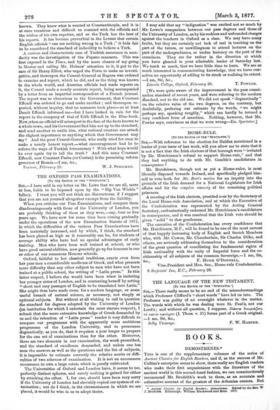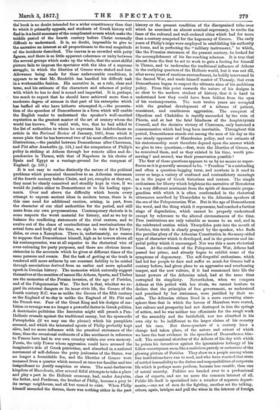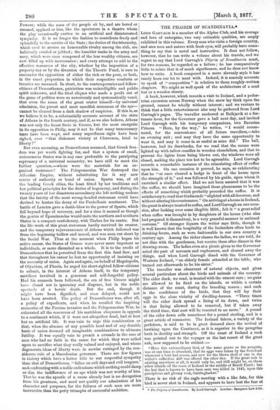BOOKS.
DEMOSTHENES.* Tars is one of the supplementary volumes of the series of Ancient Classics for English Readers, and if, as the success of Mr. Collins's enterprise seems to show, there really are English readers who make their first acquaintance with the literature of the ancient world in this second-hand fashion, we can conscientiously recommend Mr. Brodribb's work to them, as an accurate and exhaustive account of the greatest of the Athenian orators. But
* Ancient Classics for English Readers : Demosthenes. Edited by the Roy. W 3. Brodribb. Edinburgh: William Blackwood and Sone. 1877. the book is no doubt intended for a wider constituency than that to which it primarily appeals, and students of Greek history will find in it a lucid summary of the complicated events which make the middle period of the fourth century before Christ unusually difficult to understand. It is, no doubt, impossible to give to the narrative an interest at all proportionate to the real magnitude of the incidents described. The canvas is so crowded with petty figures, and there is so little apparent coherence or unity between the several groups which make up the whole, that the most skilful picture fails to impress the spectator with the idea of a supreme struggle, in which the liberties of Greece were staked and lost. Allowance being made for these unfavourable conditions, it appears to us that Mr. Brodribb has handled his difficult task in a workmanlike fashion. His narrative is, as a rule, clear and terse, and his estimate of the characters and schemes of policy with which he has to deal is sound and impartial. It is, perhaps, too much to expect that he should have achieved more than a moderate degree of success in that part of his enterprise which has baffled all who have hitherto attempted it,—the presenta- tion of the speeches of Demosthenes in a form which will enable the English reader to understand the speaker's well-merited reputation as the greatest master of the art of oratory whom the world has known. We could wish, too, that he had added to the list of authorities to whom he expresses his indebtedness an article in the National .Retfiew of January, 1861, from which it seems plain that he has borrowed two of his most effective modern illustrations,---the parallel between Demosthenes after Chwronea, and Pitt after Austerlitz (p. 134,) and the comparison of Philip's policy in striking at Athens through her remote allies and de- pendencies in Thrace, with that of Napoleon in his choice of Spain and Egypt as a vantage-ground for the conquest of England. (p. 109.) It is not easy to realise distinctly the nature of the political problems which presented themselves to an Athenian statesman of the fourth century before Christ, and yet, complex as they are, they must be clearly conceived and steadily kept in view, if we would do justice either to Demosthenes or to his leading oppo- nents. Over and above the difficulty which besets every attempt to express ancient ideas in modern terms, there is in this case need for additional caution, arising, in part, from the character of our chief authorities for the period, and still more from our own prepossessions. Contemporary rhetoric is in some respects the worst material for history, and as we try to balance the conflicting statements of the rival orators, and to evolve out of the chaos of contradictions and recriminations the actual form and body of the time, we sigh in vain for a Thuoy- dides, or even a Xenophon. There is, unfortunately, no reason to suppose that Demosthenes himself, high as he towers above all his contemporaries, was at all superior to the rhetorical vice of over-colouring for party purposes, and there are obvious incon- sistencies in the accounts which he gives at different times of the same persons and events. But the task of getting at the truth is rendered still more arduous by our constant liability to be misled through associations derived from an earlier and more splendid epoch in Grecian history. The memories which naturally suggest themselves at the mention of names like Athens, Sparta, and Thebes are the memories of the Persian invasion, of the age of Pericles, and of the Peleponneaian War. The fact is that, whether we re- gard its external dangers or its inner civic life, the Greece of the fourth century B.C. was as unlike the Greece of the fifth century as the England of tosday is unlike the England of Mr. Pitt and the French war. Fear of the Great King and his designs of am- bition or revenge was no longer a powerful factor in Greek politics. A doctrinaire politician like Isocrates might still preach a Pan- Hellenic crusade against the traditional enemy, but the spasmodic Persophobia (if we may use the phrase) which his pamphlets aroused, and which the interested agents of Philip probably kept alive, had no more influence with the practical statesmen of the time, than the occasional outbursts of alike sentiment in reference to France have had in our own country within our own memory. Persia, the (ply Power whose aggression could have aroused the imaginative aide of Greek patriotism, and absorbed in a national movement of self-defence the petty jealousies of the States, was no longer a formidable foe, and the liberties of Greece were menaced from a quarter which seemed at once too familiar and too insignificant to justify suspicion or alarm. The semi-barbarous kingdom of Macedonia, after several fitful attempts to take a place and play a part in the Hellenic economy, had, under Amyntas, the father, and Perdiccas, the brother of Philip, become a prey to its savage neighbours, and all but ceased to exist. When Philip himself ascended the throne, there was nothing either in the past history or the present condition of the disorganised tribe over which he exercised an almost nominal supremacy, to excite the fears of the cultured and well-ordered cities which had for more than a century competed for the hegemony of Greece. The early years of Philip's reign were employed in establishing his authority at home, and in perfecting the "military instrument," to which, like the Prussian statesmen of the present century, he looked for the accomplishment of his far-reaching schemes. It is true that almost from the first he set to work to gain a footing for himself in Thrace, and to undermine the traditional influence of Athens in the outlying quarters of the Hellenic world, but it was not till, after seven years of cautions encroachment, he boldly intervened in the Sacred War, and made himself master of Thessaly, that even Demosthenes began to suspect the ultimate aims of his ambitious policy. From this point onwards the nature of his designs is so clear to the modern student of history, that it is hard to understand how they could have been hidden from the eyes of his contemporaries. The next twelve years are occupied with the gradual development of a scheme of patient, consistent, and continuous aggression. The conquest of Olynthus and Chalcidice is rapidly succeeded by the ruin of Phocis, and at last the fatal blindness of the Amphictyonie Council, and the decisive victory of Chleronea, only hastened a consummation which had long been inevitable. Throughout this period, Demosthenes stands out among the men of his day as the one steady opponent of Macedonian policy, and our estimate of his statesmanship must therefore depend upon the answer which we give to two questions,—first, were the liberties of Greece, as he conceived them, and as they existed in his time, worth pre- serving? and second, was their preservation possible?
The first of these questions appears to us by no means so super- fluous as it is generally assumed to be. "Freedom "is a misleading and often a question-begging term, and nowhere is it used to cover so large a variety of confused and contradictory meanings as in the pages of Greek historians and orators. The simple enthusiasm for liberty which brightens the narrative of Herodotus is a very different sentiment from the spirit of democratic propa- gandism with which it is often confounded in the rhetorical utterances ascribed by Thucydides to the Athenian speakers of the era of the Peloponnesian War. But in the age of Demosthenes the word, and the thing which it represents, had reached a further stage of degradation, which cannot be properly understood except by reference to the altered circumstances of the time. Free institutions are only valuable as means to an end, and in the celebrated oration which Thucydides puts into the mouth of Pericles, this truth is clearly grasped by the speaker, who finds the peculiar glory of the Athenian Constitution in the many-aided type of character which it developed, and in the generous and im- perial policy which it encouraged. Nor was this a mere rhetorical boast. At the outbreak of the Peloponnesian War, Athens had passed her prime, and already began to exhibit some of the symptoms of degeneracy. The self-forgetful enthusiasm, which had led her people to dare and suffer so much for Greece half a century before, had given place to an aggressive and overbearing temper, and the new culture, if it had summoned into life the latent powers of the Athenian mind, had at the same time corrupted its simplicity. Nevertheless, when we compare Athens at this period with her rivals, we cannot hesitate to declare that the principles of free government, as understood and practised by her statesmen, were justified by their re- sults. The Athenian citizen lived in a more enervating atmo- sphere than that in which the heroes of Marathon were reared, but culture and prosperity had not destroyed in him the springs of action, and he was neither too effeminate for the rough work of the assembly and the battlefield, nor too absorbed in his own city to be indifferent to the larger claims of his country and his race. But three-quarters of a century later a change had taken place, of the nature and extent of which we have the best evidence in the speeches of Demosthenes him- self. The occasional sketches of the Athens of his day with which he points his invectives against the ignominious lethargy of his fellow-countrymen seem like a malicious parody or caricature of the glowing picture of Pericles. They show us a people among whom free institutions have run to seed, and who have reached that state of settled insensibility to the duties and responsibilities of corporate life which is perhaps more perilous, because less curable, than one of actual anarchy. Politics are handed over to a professional class of experts, and are no more the common interest of alL Public life itself is specialised into a number of separate depart- ments,—one set of men do the fighting, another set the talking, others, again, intrigue and pull the wires in the interest of foreign Powers; while the mass of the people sit by, and are bored or amused, applaud or hiss, like the spectators in a theatre whom the play occasionally excites to an artificial and disinterested sympathy. It is no longer the fashion to contribute freely and splendidly to the service of the State; the duties of the trierarchy, which used to arouse an honourable rivalry among the rich, are habitually evaded or jobbed ; the humbler ranks in the army and navy, which were once composed of the less wealthy citizens, are now filled up with mercenaries ; and every attempt to add to the effective resources of the city, whether by the imposition of a property-tax or by the diversion of the Theoric Fund, is sure to encounter the opposition of either the rich or the poor, or both, in the exact proportion in which their respective comforts or luxuries are menaced. In short, to the contemporaries and fellow- citizens of Demosthenes, patriotism was unintelligible and public spirit unknown, and the rival cliques who made a profit out of the game of politics were so notoriously and systematically venal, that even the name of the great orator himself—by universal admission, the purest and most unselfish statesman of the age— cannot be cleared from a dark shadow of suspicion. If this is, as we believe it to be, a substantially accurate account of the state of Athens in the fourth century, and if, as we also believe, Athens IVREI not only the freest State in Greece, but the most energetic in its opposition to Philip, may it not be that many unnecessary tears have been wept, and many superfluous sighs have been sighed, over "that dishonest victory at Chseronea, fatal to liberty?"
But even assuming, as Demosthenes assumed, that Greek free- dom was yet worth fighting for, and that a system of small, autonomous States was in any case preferable to the paralysing supremacy of a universal monarchy, we have still to meet the further question,—where were the materials for an or- ganised resistance? The Peloponnesian War destroyed the Athenian Empire, without substituting for it any new centre of authority or bond of union. Sparta was, of all the leading Greek cities, the least fitted by her traditions and her political principles for the duties of hegemony, and during the twenty years of her disastrous ascendancy she left nothing undone that the fatuity of the most wrong-headed statesman could have devised to hasten the decay of the Panhellenic sentiment. The battle of Leuctra gave a death-blow to the power of Sparta, which fell beyond hope of recovery, and for a time it seemed as though the genius of Epaminondas would unite the northern and southern States in a compact confederacy, with Thebes for its centre. But the life-work of this great statesman hardly survived its creator, and the temporary rejuvenescence of Athens which followed was from the beginning hollow and unreal, and was soon cut short by the Social War. Thus at the moment when Philip began his active career, the States of Greece were never more impotent as individuals, or more disunited as a whole. It is to the credit of Demosthenes that be perceived from the first this fatal flaw, and that throughout his career he lost no opportunity of insisting on the necessity of union. Again and again, on behalf of Megalopolis, of Olynthus, of Phocis, he urged his short-sighted fellow-citizens to submit, in the interest of Athens itself, to the temporary sacrifices involved in a generous and self-forgetful policy. Had his counsels been followed, the era of free Greece might have closed not in ignominy and disgrace, but in the noble spectacle of a heroic death. But the end, though it might have been dignified, and even delayed, could not have been averted. The policy of Demosthenes was, after all, a policy of expedients, and when he recalled the inspiring memories of the Persian invasion and the Peloponnesian War, he exhausted all the resources of his matchless eloquence in appeals to a sentiment which, if it were not altogether dead, had at best but an artificial life. It was vain to urge this combination or that, when the absence of any possible head and of any durable basis of union doomed all imaginable combinations to ultimate futility. It was equally vain to preach a crusade in the ears of men who had no faith in the cause for which they were called upon to sacrifice what they really valued and enjoyed, and whose degenerate ideas of liberty were in nowise outraged by the con- siderate rule of a Macedonian governor. There are few figures in history which have a better title to our respectful sympathy than that of Demosthenes, "fallen on evil days and evil tongues," and confronting with a noble enthusiasm which nothing could damp or dim the indifference of an age which was not worthy of him. That he was the apostle of a cause already lost is no derogation from his greatness, and need not qualify our admiration of his character and purposes, for the failures of such men are more instructive than the petty triumphs of successful ambition.




































 Previous page
Previous page